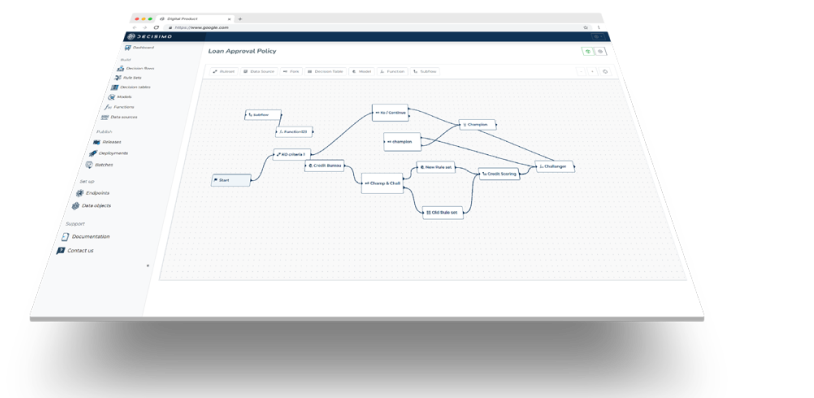Creating, Modifying, and Testing Business Rules Made Easy
Published on: 2024-08-10 18:36:09
Decisimo simplifies decision management by letting users craft, modify, and test business rules with ease.
Our platform offers a robust and intuitive interface for rule management, making it easier to implement decision logic in your business processes.
Creating and Modifying Business Rules
Creating or altering rules in Decisimo is straightforward. Users can compile related rules into rulesets, each tagged with an ID and title for easy identification. Each rule has two components: conditions and actions.
Conditions specify the criteria that trigger the rule, while actions dictate what occurs upon triggering.
Flexible Rule Definitions
Our platform supports a variety of condition and action definitions, ranging from data attribute comparisons and regular expressions to direct JSON input.
You can choose among various condition operations, including text and numeric comparisons, as well as functions that respect or ignore text case.
Actions can be as simple as arithmetic operations or as complex as array manipulations.
Easy Rule Management
With Decisimo, you can temporarily deactivate rules rather than delete them. This makes it simple to trial different rules without erasing prior configurations.
We also maintain a history for each ruleset, enabling you to review past versions and track changes.
Testing Business Rules
Our platform allows in-house rule testing. Each test execution is logged and the outcomes are presented in a clear, organized response field.
The response contains a sorted list of rules activated during testing, based on the input data.
Rule Sequence Adjustments
Reordering rules is a drag-and-drop operation on Decisimo. The updated sequence directly influences rule execution order, letting you optimize rule configurations with ease.
Keep Rules Manageable
Despite offering a broad feature set, it's crucial to avoid overly complex rules. Complex rules are harder to interpret, maintain, and can obscure business logic.
It's advisable to break down intricate rules into smaller, simpler units for easier management and greater transparency.

